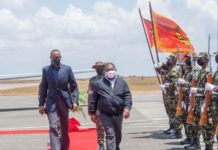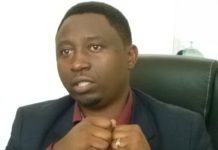PRESS RELEASE
It has been pointed out by independent experts on Rwanda including independent Human Rights organisations such as Human Rights Watch and Amnesty International and academicians that the Rwandan government has used genocide to silence journalists, politicians and citizens who peacefully advocate political views that differ from those of the ruling party in order to solidify its power. As Professor Chi Mgbako says the manipulation of the genocide memory “trivializes the genocide and does not honour the Rwandan dead”.
As part of its strategy to impose its narrative of the history of Rwanda, the RPF has embarked on two major objectives: the first is to change the names and boundaries of existing administrative units in order to bring confusion with regard to locations where the RPF army committed crimes and secondly to eliminate any person likely to give an authoritative narrative about the real history of Rwanda and on genocide, fearing that such a different narrative would help change the attitude of the international community particularly with regard to the wars waged by the RPF from 1990 to 2002.
Having achieved the first objective, the regime has been working around the clock to achieve the 2nd objective. The arrest of Mr Enoch Ruhigira on the 20th July 2016 is part of the strategy. His arrest and detention without a valid arrest warrant issued by Interpol has demonstrated once again the determination of the RPF to do away with anyone holding information that contradicts the RPF narrative on the Rwandan tragedy.
In this regard, we would like to mention that Enoch Ruhigira has written two books which have been published: « La fin tragique d’un régime: Vol. I: Le legs démocratique gaspillé, Mai 2011; Vol. II: Une vision étouffée par des intérêts partisans, Novembre 2011 ». The two books give vital insights and information that provide valuable clues on the responsibilities of all actors in the Rwandan tragedy in Rwanda including the role of the RPF. As we know mentioning the RPF in the Rwandan tragedy is an anathema.
We would like to point out that the Commission responsible for the control of l’O.I.P.C.-Interpol files made it known to the Rwandan State, in its letter dated 18th November 2014, that in line with its investigation procedure, it had found no basis to keep Enoch Ruhigira on its list. In a letter dated 22 September 2015 addressed to E. Ruhigira, reference number CCF / 93 / R445.14 / C 2080.15, it is stated as follows: « We wish to inform you that the procedure detailed in our letter dated 18 November 2014 has been applied to the processing of your request. Please be advised that the information which you referred to in your letter dated 01 November 2014, is no longer registered in Interpol’s files; nevertheless, we wish to draw your attention to the fact that the Commission’s powers are limited to supervising the processing of information in Interpol’s files. It is not, therefore empowered to act with regards to national files ».
Noting that Mr. Enoch Ruhigira could not be prosecuted for crimes of genocide allegedly committed respectively on 28 April 1994, 30 May 1994 and 17 June 1994 in Kibuye as recorded in the international arrest warrant which had informed the decision taken by Interpol Germany to put him on its list, due to the fact that Ruhigira had proved with solid evidence that he was not in Rwanda on those dates, the government seems to have changed its strategy and decided to accuse him of crimes allegedly committed before genocide.
According to the latest information from the pro government newspaper “Igihe”, Mr. Enoch Ruhigira is accused of having planned the massacres of Tutsis in Bigogwe, Kibirira and Bugesera between 1992 and 1994 and for having conducted numerous meetings relating to these massacres. According to Mr. Faustin Nkusi, Prosecutor General and spokesman of the Republic of Rwanda, Mr. Ruhigira allegedly planned the massacres in complicity with the Colonels Theoneste Bagosora, Anatole Nsengiyumva and Sagatwa Elie.
This ever recurring claims of RPF about the planning of genocide is contrary to the conclusions of various independent reports and of the International Criminal Tribunal on Rwanda (ICTR) which reveal that they have been unable to find traces of meetings where the planning of the genocide was discussed. Besides Enoch Ruhigira cannot be held responsible for crimes that he did order or participate in. Indeed, paragraphs 5645-5651 of the judgment of the ICTR June 24, 2011 indicate the following with respect to the criminal responsibility of a superior for the acts of his/her subordinates: “5651. Other factors indicative of effective control include the accused’s position, the procedure for appointment, the actual tasks performed, his or her capacity to issue orders, the nature of such orders, and whether any orders were followed. The Chamber recalls that although the authority to issue orders may be indicative of effective control over subordinates, it does not automatically establish such control. Effective control can only be determined by looking at the evidence in its entirety on a case-by-case basis.”
It should be noted that the International Commission of Inquiry on Violations of Human Rights in Rwanda since 1 October 1990, conducted its work in Rwanda, and investigated the violence in Bugesera, in Bagogwe and Kibirira, and elsewhere where there had been massacres and other acts of violence. Its report, released in March 1993 never mentioned the name of Enoch Ruhigira nor names of the alleged accomplices, as having been involved in the violence in the regions mentioned above. In the report published by the Commission, Kibirira events are dealt with from page 18 to page 26, those relating to Bagogwe are dealt with on pages 27 to page 42, while those relating to Bugesera are dealt with on pages 42 to 47; the conclusion of the report can be read on page 48 to page 50.
Another commission was set up by the Government of Rwanda, dated 3 February 1993 to investigate the violence that took place in Gisenyi, Ruhengeri and Kibuye, in January 1993. The Committee was chaired by Mr. Augustin Iyamuremye, then Chief of Internal Intelligence, and member of the political Bureau of the opposition party PSD. He worked in the Prime Minister’s Office, the Prime Minister being Dismas Nsengiyaremye from the opposition political party MDR. The commission included other senior officials from different political parties. It presented its report which was attached to letter No. 76 / 02.2.1 of Mr Iyamuremye addressed to the Mr. Prime Minister, and dated April 3, 1994. The names of Enoch Ruhigira do not appear among those responsible for violence. The names of the two Colonels considered as accomplices of Enoch Ruhigira do not appear in the report. Mr Augustin Iyamuremye is currently working in Kigali as Senator in the current Rwandan regime.
FDU-Inkingi are convinced that Rwandans need genuine reconciliation underpinned by the truth about the Rwandan tragedy. The witch hunt and attempts RPF to get rid of an entire generation of people who witnessed the lies and crimes of the RPF can only lead to polarisation and radicalisation that could sadly lead to a new round of violence.
Democratic countries, such as Germany, should refuses to be drawn into the Machiavellian operations of RPF that are geared towards consolidating its dictatorial and violent regime.
Done in London
August 17, 2016
FDU INKINGI
Justin Bahunga
Commissioner for External Relations and Spokesperson































































